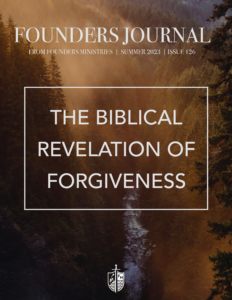Forgiveness is divine. That is to say that it takes divine and supernatural grace to forgive. It could be argued that only those who have been forgiven by divine grace are empowered by divine grace to (properly) forgive. There are several reasons why divine grace is needed for forgiveness:
- Forgiveness may seem easy until we have been deeply wounded and offended by a close friend. The closer the friend and the greater the offense, the more difficult it is to forgive. It is one thing to overlook a stranger accidentally stepping on our toes, and it is another thing to forgive a spouse who has been having a year-long secret affair. Nothing within our fallen nature would motivate us to forgive such an evil act. In such situations, we learn that we need outside help from God to forgive.
- Forgiveness may seem easy until we learn what it demands from us. Forgiveness is not “letting it go” and moving on with life. Forgiveness is not living with an unfaithful spouse as if nothing is wrong for the sake of the children or financial stability. Forgiveness is not ignoring the offense. Forgiveness is hard because it requires something positive from us. Forgiveness is not a passive response but an active responsibility. We have to give to those who have taken from us. We have to love those who hate us. We have to pay the debt of those who have stolen from us. How is this possible without divine grace?
- Forgiveness may seem easy until we learn all that it requires of us. First, forgiveness is an act of love because it requires us to pursue after those who are actively running away from us. The Lord didn’t wait for us to repent before He pursued us with the gospel of forgiveness. Even while we were sinners, He died for us (Rom. 5:8). And while the crowds were saying, “Crucify him,” the Lord was saying, “Father forgive them” (Luke 23:34). What kind of grace do we need to display this type of love towards our enemies? To desire reconciliation and show acts of kindness to those who are not even shown signs of repentance is extremely hard, if not impossible without divine grace. Second, forgiveness is a sacrificial payment. It is the opposite of revenge. It is the opposite of retribution. This is why it is so hard. Why should the perpetrator get out of jail free while the victim is called by God to endure the imprisonment? What is the imprisonment? It is the pain and hurt one feels when he or she is transgressed against. To forgive is to commit to absorb the pain without reflecting any of it back on the guilty person. It is gracious to pay for someone’s meal, but it is doubly gracious to pay for someone’s meal after they have stolen from you. But this is forgiveness—and this is why it is so hard.
- Forgiveness may seem easy until we have to find the strength to forgive. To have the desire and power to do good to those who have done us evil is not a work of the flesh but a fruit of the Spirit. Jesus said, “apart from me, you can do nothing.” If we need the power of Christ to do the least charitable deed, how much more do we need the power of Christ to forgive those who have transgressed against us.
Where does this grace and power come from? How can we even begin to have the love and compassion to forgive others? The answer comes from God. We can forgive because we have been forgiven. God will take care of justice but thank God that He has paid for our sins and has cancelled out our debt. Because of the cross, not only is God able to forgive us, but we too are able to forgive all those who sinned against us. This is the power of the gospel, and o’ how we need it.






























